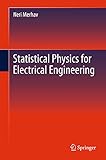Statistical Physics for Electrical Engineering [electronic resource] / by Neri Merhav.
By: Merhav, Neri [author.] .
.
Contributor(s): SpringerLink (Online service) .
.
Material type:  BookPublisher: Cham : Springer International Publishing : Imprint: Springer, 2018Edition: 1st ed. 2018.Description: XII, 137 p. 21 illus., 3 illus. in color. online resource.Content type: text Media type: computer Carrier type: online resourceISBN: 9783319620633.Subject(s): Electrical engineering
BookPublisher: Cham : Springer International Publishing : Imprint: Springer, 2018Edition: 1st ed. 2018.Description: XII, 137 p. 21 illus., 3 illus. in color. online resource.Content type: text Media type: computer Carrier type: online resourceISBN: 9783319620633.Subject(s): Electrical engineeringPreface -- Introduction -- Kinetic Theory and the Maxwell Distribution -- Elementary Statistical Physics -- Quantum Statistics – the Fermi–Dirac Distribution -- Quantum Statistics – the Bose–Einstein Distribution -- Interacting Particle Systems and Phase Transitions -- Vibrations in a Solid – Phonons and Heat Capacity -- Fluctuations, Stochastic Dynamics and Noise -- A Brief Touch on Information Theory.
The main body of this book is devoted to statistical physics, whereas much less emphasis is given to thermodynamics. In particular, the idea is to present the most important outcomes of thermodynamics – most notably, the laws of thermodynamics – as conclusions from derivations in statistical physics. Special emphasis is on subjects that are vital to engineering education. These include, first of all, quantum statistics, like the Fermi-Dirac distribution, as well as diffusion processes, both of which are fundamental to a sound understanding of semiconductor devices. Another important issue for electrical engineering students is understanding of the mechanisms of noise generation and stochastic dynamics in physical systems, most notably in electric circuitry. Accordingly, the fluctuation-dissipation theorem of statistical mechanics, which is the theoretical basis for understanding thermal noise processes in systems, is presented from a signals-and-systems point of view, in a way that is readily accessible for engineering students and in relation with other courses in the electrical engineering curriculum, like courses on random processes.


There are no comments for this item.